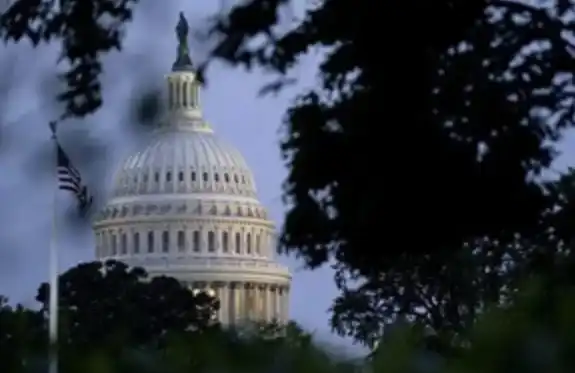What are the key provisions of the "Build Back Better Act" that enraged Musk?
Original Title: "The $3.3 Trillion Tax Cut, $5 Trillion Debt Ceiling, Musk Angry: Analyzing Trump's 'One Big Beautiful Bill Act'"
Original Source: Deep Tide TechFlow
The $3.3 trillion tax cut, $1.13 trillion spending reduction, 1118-page bill text... a super bill called the "One Big Beautiful Bill Act of 2025" (OBBBA) is reshaping the American economic landscape, triggering a new partisan dispute, and even making Musk "furious." On July 1, Musk posted on the social platform X, stating that if the current "insane spending bill" is passed (the "One Big Beautiful Bill Act"), he will establish the "America Party" the next day to protest against this bill.
As a hallmark policy of Trump's second term, this bill can be described as "all-encompassing." It carries the ambitious goals of the Republican Party and ignites intense social controversy. This article will delve into the core content of the "One Big Beautiful Bill Act," the discussions it has sparked, and its potential impact on the crypto industry, revealing the full picture of this legislative storm.
The Big Bill
The "One Big Beautiful Bill Act" is a large-scale tax and spending bill pushed by U.S. President Donald Trump in 2025, covering tax reform, healthcare reform, immigration policy, defense budget, energy policy, and education and welfare reform in six major areas.
As a signature legislation of Trump's second term, it attempts to stimulate the economy through large-scale tax cuts, increased spending, and policy adjustments while addressing fiscal, immigration, and national security issues. The bill text spans 1118 pages, containing 237,327 words and involving multiple complex provisions. During Senate deliberations on the bill, it took 16 hours to read the entire text word for word. According to a June 28 BBC report summary, the core contents of the "One Big Beautiful Bill Act" include the following nine aspects:

According to the Tax Foundation's estimate, the "One Big Beautiful Bill Act" is expected to reduce federal tax revenues by approximately $3.3 trillion (dynamic estimate) through tax cut policies from 2025 to 2034, while increasing defense spending by about $150 billion, mainly for missile defense, ammunition, and shipbuilding. At the same time, the bill will also significantly reduce spending by about $1.13 trillion, including an $800 billion cut to Medicaid and $330 billion in savings from student loan program reforms.
On the economic front, this bill is projected to boost long-term GDP growth by 0.6%, but it will lead to a 0.2% decrease in capital stock and a 0.1% drop in pre-tax wages, while adding approximately 794,000 full-time equivalent jobs. Ultimately, the bill is expected to increase the deficit by $3.3 trillion between 2025 and 2034, posing fiscal sustainability risks in the long run due to higher interest rates and private investment crowding out effects.
Furthermore, the Congressional Budget Office (CBO) estimates that if the bill is enacted based on the House version, it would increase the U.S. debt by $2.4 trillion, leading to a 4% decline in purchasing power for the bottom 10% of households from 2026 to 2034, while the top 10% of households would see nearly a 3% increase in purchasing power, sparking controversy over "robbing the poor to pay the rich."
But the controversy does not stop there.
Main Controversy
The "Big and Beautiful Bill" was first unveiled by the U.S. House Ways and Means Committee on May 12, 2025, passed the House by a slim margin of 215 to 214 on May 22, and cleared a procedural vote in the Senate on June 28 by a 51-49 margin to proceed to formal deliberations, with an expected signing into law by Trump before the July 4th Independence Day holiday. Due to its massive scale, complex content, and far-reaching impact, it has become a focal point of U.S. politics and public opinion, triggering wide-ranging debates and intense discussions.
Advocates of the bill see it as a cornerstone of the Trump administration's agenda. Supporters argue that through tax cuts and increased defense spending, the bill will stimulate economic growth and enhance national security, with some voters particularly backing the administration's tough immigration and border policies.
However, there are clear divisions within the Republican Party, with some hardliners demanding further cuts to social welfare spending, while moderates seek to preserve programs like healthcare subsidies, expressing concerns that the bill could lead to increased deficits and impact low-income groups. The slim margins of victory in the May 22 and June 28 votes reveal the internal rifts within the party.
Beyond internal party divisions, a more widely known aspect is the staunch opposition to the bill by former Director of the Department of Government Efficiency (DOGE) and Tesla founder Elon Musk. In light of the bill, Musk's public feud with President Trump is seen as a defining moment of their open rupture. Since June 3, he has referred to it as "vast, ludicrous, and utterly repulsive," and even after the most recent procedural vote on June 28, he remains steadfast in his belief that this is a "political suicide" for the Republican Party.

Elon Musk criticized the bill for significantly increasing the budget deficit, with the next fiscal year's deficit expected to increase by $600 billion, potentially reaching $2.5 trillion over the next decade. This goes against the previous goal of the Trump administration to cut government spending.
Furthermore, the bill's provision to gradually phase out the electric vehicle tax credit could have a negative impact on Tesla, further fueling Musk's dissatisfaction. He also proposed transferring the Federal Aviation Administration's (FAA) air traffic control system to his "Starlink" operation, but this proposal was not adopted, sparking further controversy. Musk even threatened to fund primary challenges against Republican lawmakers who oppose the bill, highlighting his disagreement with Trump.
The Democratic party unanimously opposes the bill, viewing it as a classic example of "robbing the poor to pay the rich" by cutting healthcare and welfare support for low-income groups to benefit the wealthy through tax cuts. Senate Democratic leader Schumer requested a reading of the bill in full to delay the vote, demonstrating a strong stance of resistance. Nobel laureate in economics Paul Krugman also criticized the bill as an unprecedented act of favoring the rich and pointed out that combined with Trump's tariff policies, it would further harm the interests of the bottom 80% of households.
The public and media's reactions have been polarized. Supporters believe the bill fulfills Trump's campaign promises, such as tax cuts and strict immigration policies, while opponents are concerned that it may exacerbate social inequality and debt burdens. Some users also noted potential issues of digital identity and big data surveillance post-bill passage, raising concerns about privacy protection.
From an international perspective, foreign investors hold a cautious optimistic view of the bill, believing that its stimulus measures may offset the negative impact of tariff policies on GDP by approximately 1%. However, the bill's provision in section 899 "Enforcement of Remedies Against Unfair Foreign Taxation" involving retaliatory taxation has raised concerns about foreign investment motives and dollar stability.
Overall, the passage of the "Build Back Better Act" has not only sparked widespread political and social controversies within the United States but also had a profound impact on the international economic environment and investment confidence. Although the White House has issued a fact-check article responding to the current majority of controversies, the future implementation effects remain to be seen.
What About Cryptocurrency?
On the surface, the well-known provisions of the Build Back Better Act may weaken federal court powers, devastate the healthcare system, increase debt burdens, intensify immigration enforcement, restrict foreign investment, worsen air pollution, and boost defense budgets, impacting a wide range of areas unrelated to cryptocurrency.
However, the reality may be different. The passage of the "Build Back Better" Act (OBBBA) is likely to have a profound impact on the cryptocurrency and financial industry. The 2024 U.S. Republican Party platform explicitly includes clauses supporting cryptocurrency, opposing overregulation, and supporting citizens' right to self-manage digital assets, reflecting the government's positive attitude towards the crypto industry. Furthermore, the establishment of an "Strategic Bitcoin Reserve" through an executive order, which incorporates Bitcoin into the national strategic reserve assets, signifies a fundamental elevation in Bitcoin's status.
The bill is expected to result in an additional $5 trillion deficit for the U.S. government, and this scale of fiscal expansion may weaken market trust in the U.S. dollar and treasuries. The reduction of foreign holdings of treasuries has become a structural trend, and funds outflow may flow into Asian stock markets, gold, and Bitcoin (BTC), further enhancing Bitcoin's position as a global store of value asset, especially against the backdrop of Bitcoin being included in the U.S. strategic reserve assets.
Meanwhile, the tax reduction policies and fiscal stimulus measures in the bill have created a more relaxed macro environment for crypto assets. The favorable capital gains tax policies encourage investors to hold digital assets long term, injecting long-term funds into the cryptocurrency market and further solidifying the U.S.'s position as a global cryptocurrency hub.
On June 11, 2025, Cahill released an analysis report on an upcoming cryptocurrency legislation amendment. The report stated: This is an "anticipated amendment to be proposed by Republican Senator Cynthia Lummis of Wyoming," an "unreleased digital asset legislative proposal," "planned to be included as an amendment to the large and beautiful bill."
This bill involves specific provisions in niche areas such as mining, staking, airdrops, cross-border transactions, as well as the formulation of inclusive policies regarding a $600 threshold, foreign investor taxation, reflecting the regulator's cautious attitude in balancing industry development and tax management.
Market dynamics show that since May, over 100,000 BTC has flowed out of exchanges like Coinbase, with whale accumulation indicating a continued bullish sentiment for Bitcoin. Whether it's the balance between tax cuts and deficits, a toughening stance on immigration policy, or the impact on cryptocurrency and the financial market, these factors will continue to shape the economic and social landscape of the U.S. in the coming years.
The future of the U.S. remains to be seen.
Welcome to join the official BlockBeats community:
Telegram Subscription Group: https://t.me/theblockbeats
Telegram Discussion Group: https://t.me/BlockBeats_App
Official Twitter Account: https://twitter.com/BlockBeatsAsia
 Forum
Forum OPRR
OPRR Finance
Finance
 Specials
Specials
 On-chain Eco
On-chain Eco
 Entry
Entry
 Podcasts
Podcasts
 Activities
Activities









